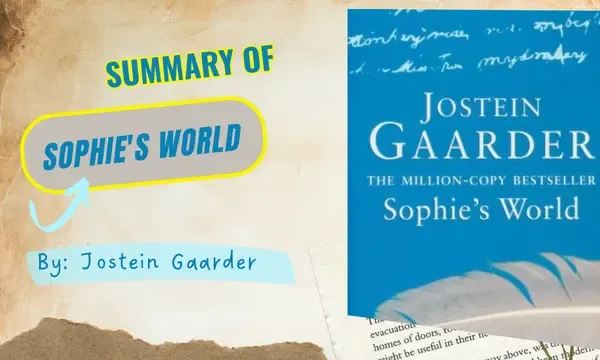The main topic of "Sophie's World" is the history of philosophy, presented through a fictional narrative. It explores the fundamental questions of human existence, the nature of reality, and the search for meaning.
 |
| Summary of Sophie's World by Jostein Gaarder |
The general idea of Sophie's World
The world is a mystery, and philosophy provides a framework for exploring and understanding its mysteries.
Philosophy is not just a subject for intellectuals but is relevant to everyone's life.
The history of philosophy is a continuous conversation between philosophers across different time periods and cultures.
Different philosophical theories and perspectives offer various explanations for the nature of reality, knowledge, and ethics.
Philosophy encourages critical thinking, self-reflection, and the ability to question assumptions.
About the author of Sophie's World
Jostein Gaarder is a Norwegian author and former philosophy teacher. He has written numerous novels and is known for his ability to make complex philosophical ideas accessible to a wide audience.
Sophie's World book chapters
- The Garden of Eden: Introduces Sophie Amundsen, a 14-year-old girl, who receives mysterious philosophical letters and begins her philosophical journey.
- The Top Hat: Sophie learns about the pre-Socratic philosophers and their theories about the nature of the world.
- The Myths: Sophie discovers ancient Greek myths and their connection to philosophical ideas.
- The Natural Philosophers: Sophie explores the ideas of thinkers like Democritus and Heraclitus and the concept of the four elements.
- Plato: Sophie delves into the world of Plato, his theory of Forms, and the allegory of the cave.
- Aristotle: Sophie learns about Aristotle's philosophy, his ideas on logic, and the concept of potentiality and actuality.
- Hellenism and Early Christianity: Sophie examines the influence of Hellenistic philosophy and early Christian thought.
- The Middle Ages: Sophie explores the philosophical ideas of thinkers like Augustine, Aquinas, and William of Ockham.
- Renaissance: Sophie encounters Renaissance thinkers like Descartes, Bacon, and Galileo, and their contributions to science and philosophy.
- Baroque: Sophie explores the ideas of philosophers like Spinoza and Locke and the emergence of rationalism and empiricism.
- Enlightenment: Sophie learns about the ideas of Enlightenment thinkers such as Hume, Rousseau, and Kant, and their impact on society.
- Romanticism: Sophie delves into the world of Romanticism and the philosophy of thinkers like Hegel and Kierkegaard.
- Darwinism: Sophie encounters Darwin's theory of evolution and its philosophical implications.
- Marx: Sophie explores the ideas of Karl Marx and his critique of capitalism.
- Existentialism: Sophie examines existentialist philosophers like Sartre and Camus and their exploration of human existence.
- The Postmodern Condition: Sophie explores postmodern philosophy and its critique of objective truth and grand narratives.
- A Postscript from Sophie: Sophie reflects on her journey and contemplates the role of philosophy in her life.
Sophie's World Book Conclusions
- Philosophy provides a framework for asking fundamental questions about life, reality, and meaning.
- The history of philosophy is a rich tapestry of ideas and perspectives that have shaped human thought.
- Philosophy encourages critical thinking and self-reflection, helping individuals develop their own worldview.
Sophie's World compared to other books
"Sophie's World" stands out among books on philosophy due to its unique format of combining a fictional narrative with an exploration of philosophical ideas. This approach makes it engaging and approachable for readers who may find pure philosophical texts daunting.
Read more:
Summary of the book A Theory of Justice by John Rawls
Summary of the Critique of Pure Reason by Immanuel Kant
Sophie's World book audience
The book is primarily aimed at young adult readers, but it can be enjoyed by anyone with an interest in philosophy or seeking an introduction to philosophical concepts.
Sophie's World Publication Date
"Sophie's World" was published by Farrar, Straus and Giroux in 1991.
Recommendations for other books
- "The Philosophy Book: Big Ideas Simply Explained" by DK
- "A History of Western Philosophy" by Bertrand Russell
- "The Story of Philosophy: The Lives and Opinions of the World's Greatest Philosophers" by Will Durant
Philosophy is not just an abstract discipline, but a practical tool for exploring life's mysteries and developing a deeper understanding of ourselves and the world around us.
